SRM-AP All News
ALL News
- SRM University-AP celebrates the exorbitant success in Maiden Batch Placement 2021 May 3, 2021
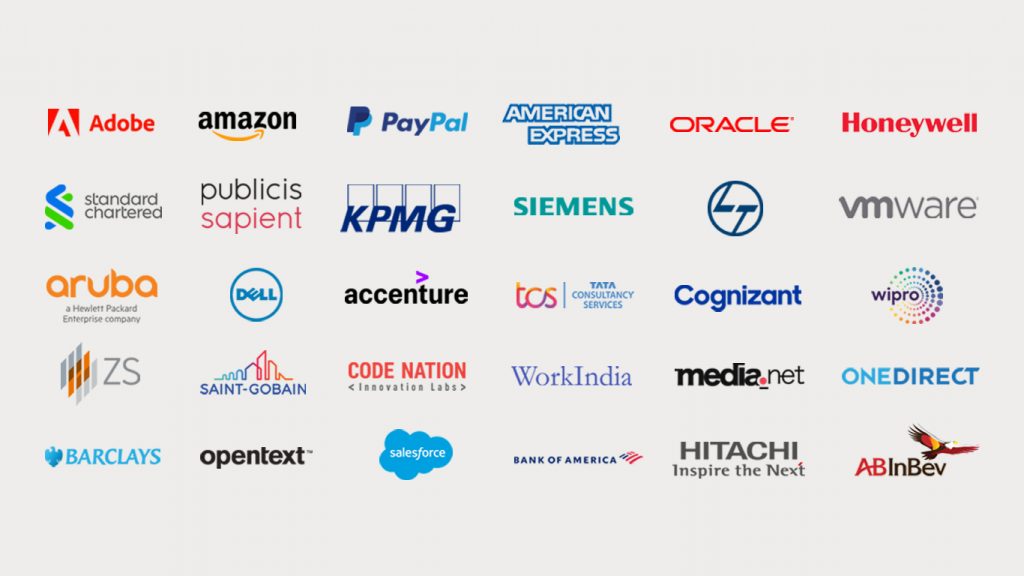 SRM University-AP initiated its journey in the year 2017, and now it is time to bid farewell to the maiden batch of students. The university is proud to share that 100% of our graduating students are placed successfully. About 500 companies visited SRM campuses during the Placement drive, including Amazon, Adobe, Infosys, HealthRx, Bank of America, Standard Chartered and many more who have offered exhilarating opportunities. Students of the founding batch have received one or more job offers in reputed companies with the highest CTC of ₹29.5 LPA, an average salary of ₹6.2 LPA, and over 57% offers were Super Dream and Dream offers. The Campus Placement drive is still on and best efforts are put in to ensure that all the students are placed.
SRM University-AP initiated its journey in the year 2017, and now it is time to bid farewell to the maiden batch of students. The university is proud to share that 100% of our graduating students are placed successfully. About 500 companies visited SRM campuses during the Placement drive, including Amazon, Adobe, Infosys, HealthRx, Bank of America, Standard Chartered and many more who have offered exhilarating opportunities. Students of the founding batch have received one or more job offers in reputed companies with the highest CTC of ₹29.5 LPA, an average salary of ₹6.2 LPA, and over 57% offers were Super Dream and Dream offers. The Campus Placement drive is still on and best efforts are put in to ensure that all the students are placed.Dr P Sathyanarayanan, Founder and President, established this university with a vision of providing quality education to the students who will not only be able to secure a position of their choice but also add value to society. It has been an incredible journey so far, and the students made the university proud with their excellence in academics and extra-curricular activities. “Acknowledging the needs of the hour, SRM University-AP is dedicated to devising strategies to mould students to become global leaders,” said Dr Sathyanarayanan.
The university took it as a challenge to find the best job offers for its deserving students. The Department of Corporate Relations and Career Services (CR&CS) was deeply involved in providing students with the best training and placement opportunities. SRM University-AP believes that every student is filled with numerous possibilities, and they can scale greater heights if their potentials are explored wisely. The students of the maiden batch proved the vision.
“We always bring the best to our students when it comes to their training and personality development. The thoughtfully crafted training sessions, in close coordination with industry and corporate experts, rigorous aptitude tests, mock interview rounds help students to excel in the interviews and placement rounds”, informed Mr M S Vivekanandan, Assistant Director, CR&CS.
Sri Ritika Katragadda, a final-year student in the Department of Computer Science and Engineering, secured the highest pay package. She expressed her joy, saying, “Though we were the first graduating batch of SRMAP, the outstanding experience in the past four years in academics and placement training made us so confident that we cracked the long hiring process with ease”.
Prof V S Rao, Vice-Chancellor, SRM University-AP, opined, “Our university is the flag-bearer when it comes to inculcating quality, value and excellence among the students in order to make them an asset to the society. The maiden batch placement programme was bound to be a success as it was not a job hunting for our students, rather, finding opportunities to contribute to the society, putting into use their intellect and innovative ideas”.
SRM University – AP Placements 2021
Continue reading →
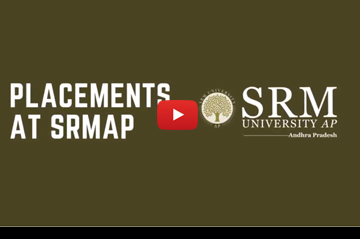
- SRM University-AP Student earns Erasmus Mundus Scholarship 2021 May 1, 2021
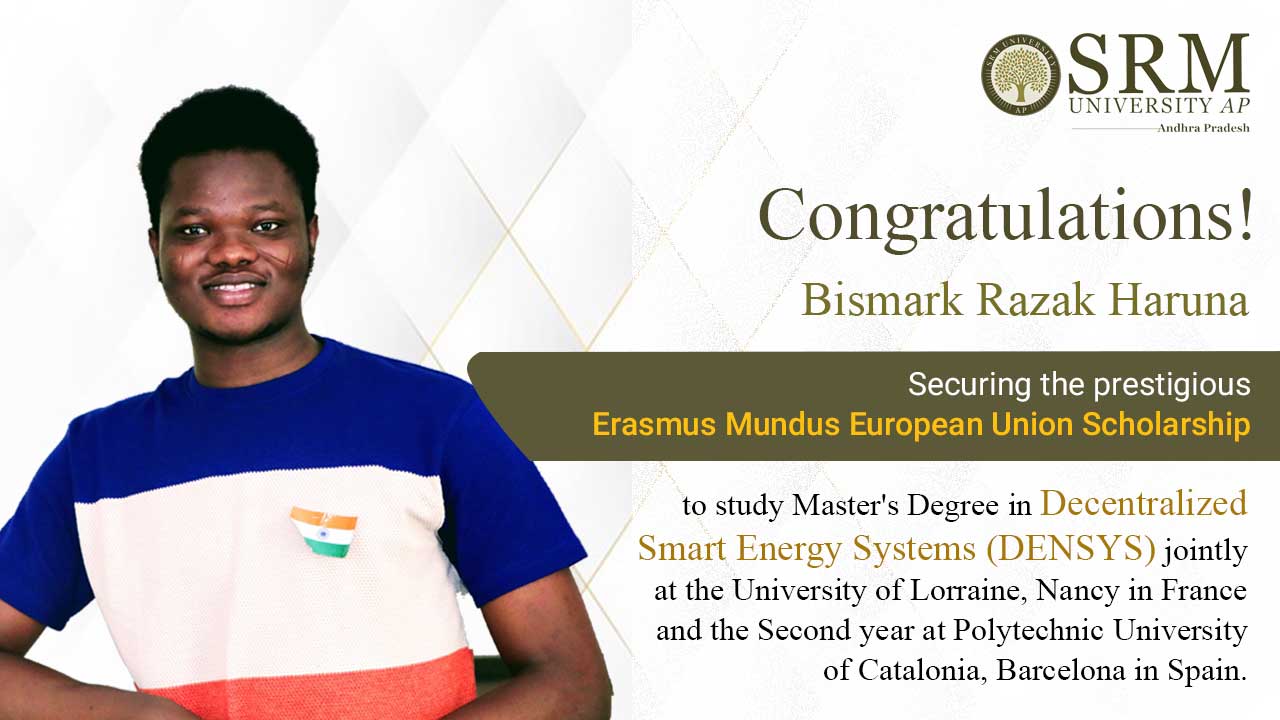 Since its inception, SRM University-AP, Andhra Pradesh, has retained its exalted heights of excellence and brilliance. Avid students over the years have brought laurels to the organisation with impressive research work, outstanding academic performance or Guinness World Record for spectacular artistry. Bismark Razak Haruna, a B. Tech Final Year Student at the Department of Mechanical Engineering, is deemed to be bestowed on the highly prestigious Erasmus Mundus scholarship. The globally acclaimed European Union-funded scholarship will help Bismark pursue the joint master’s degree programme in Decentralised Smart Energy Systems (DENSYS) in renowned universities of Europe.
Since its inception, SRM University-AP, Andhra Pradesh, has retained its exalted heights of excellence and brilliance. Avid students over the years have brought laurels to the organisation with impressive research work, outstanding academic performance or Guinness World Record for spectacular artistry. Bismark Razak Haruna, a B. Tech Final Year Student at the Department of Mechanical Engineering, is deemed to be bestowed on the highly prestigious Erasmus Mundus scholarship. The globally acclaimed European Union-funded scholarship will help Bismark pursue the joint master’s degree programme in Decentralised Smart Energy Systems (DENSYS) in renowned universities of Europe.Bismark sets an example by being the first Ghanaian to get into the DENSYS program. He expressed that as part of the mobility scheme of the programme, he would pursue the first year at the University of Lorraine, Nancy, France, and continue the final year at the Polytechnic University of Catalonia, Barcelona, Spain. The Erasmus Mundus Scholarship help students enrol into the world’s best universities for masters and doctoral programmes with substantial benefits. Bismark shared his thoughts, “I welcome the opportunity to play an important role in increased electrification in Sub-Saharan Africa through the integration of renewable energy sources for a low carbon society”.
Approximately 392 aspirants applied for the DENSYS program globally, and out of 23 students from 17 countries, Bismark secured his place. Erasmus Mundus Scholarship Programme covers the expenditure involving the tuition fee, insurance, participation in activities such as the lab courses, excursion, research projects, financial support for housing, feeding, transportation and installation fee as well.
While speaking of his success, Bismark expressed his gratitude towards the SRM University-AP for consistently providing him with golden opportunities and resources. “From conceptualising undergraduate research project to studying abroad at UC Berkeley, the University has been a constant support. A special thanks to my motivators and mentors- Dr Prakash Jadav, Dr Satya Pramod Jammy, Dr Sarfaraz Hussain Halkarni, Dr Ram Kuresh Thakur, Dr Srabani Basu, Ms Revathi Balakrishnan for grooming and guiding me throughout the journey. I convey my sincere thanks to my buddies as well for helping me out with the scholarship application”, Bismark added while being ready for exploring the next chapter of his life in the European Union.
Continue reading → - Undergrad Student research predicts stock market valuations April 26, 2021
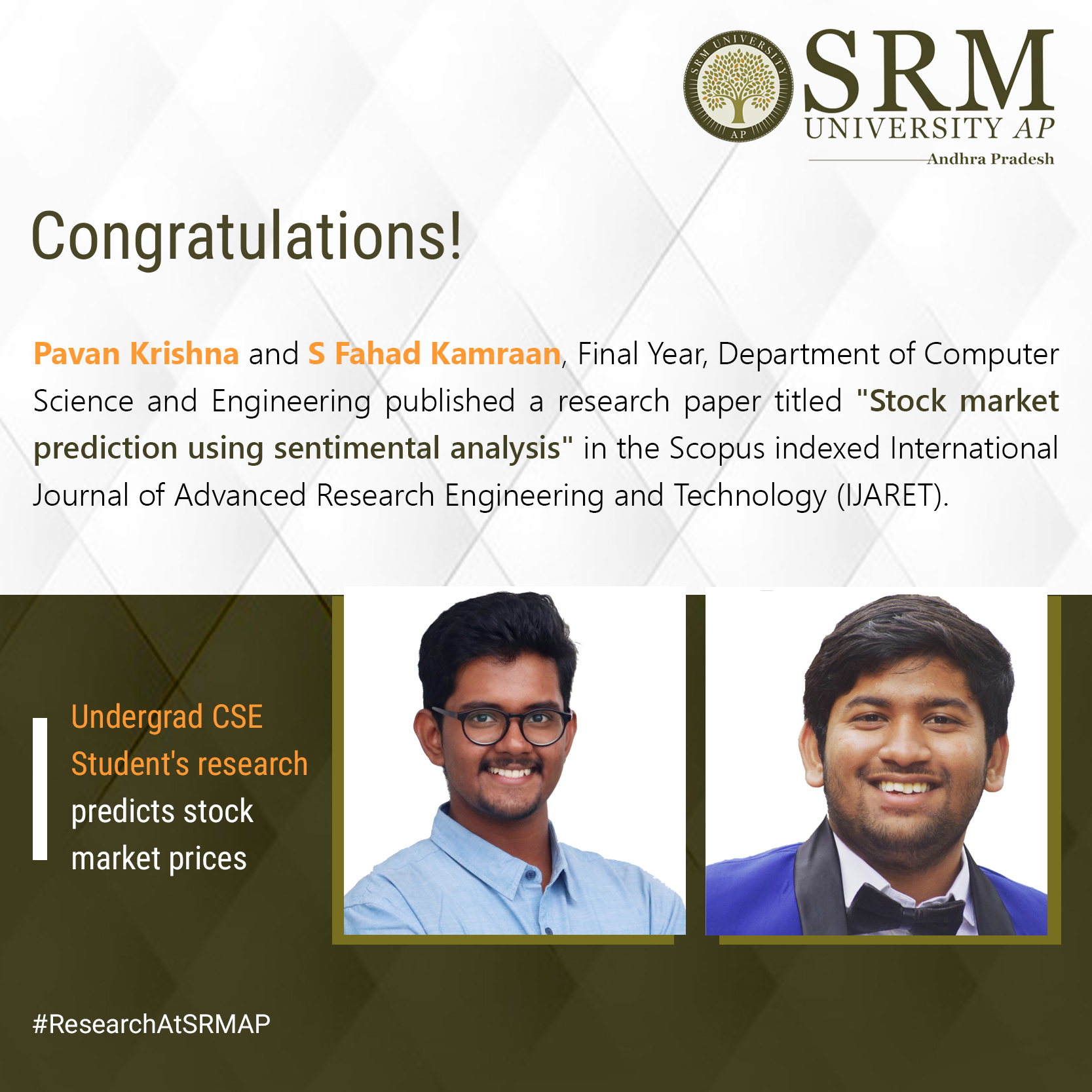 Pavan Krishna and S Fahad Kamraan, guided by Dr Priyanka, Department of Computer Science and Engineering, SRM University-AP, Andhra Pradesh, successfully published a research paper titled “Stock market prediction using sentimental analysis” in the Scopus indexed “International Journal of Advanced Research Engineering and Technology (IJARET)” on March 2021. Being the students of the Department of Computer Science and Engineering, both researchers have apt knowledge on the sentimental analysis commonly known as opinion mining or emotion AI led to the successful execution of the research project.
Pavan Krishna and S Fahad Kamraan, guided by Dr Priyanka, Department of Computer Science and Engineering, SRM University-AP, Andhra Pradesh, successfully published a research paper titled “Stock market prediction using sentimental analysis” in the Scopus indexed “International Journal of Advanced Research Engineering and Technology (IJARET)” on March 2021. Being the students of the Department of Computer Science and Engineering, both researchers have apt knowledge on the sentimental analysis commonly known as opinion mining or emotion AI led to the successful execution of the research project.Sentimental analysis is used to help find patterns in textual data, to understand people’s emotions and sentiments in a much deeper and holistic way. It is used to find the polarity of the information and to classify it under different emotion/ sentiment radar all the way from sad to happy or too excited.
The key title takes a dig into a study involving a new method of predicting stocks by performing sentimental analysis on the financial data. A sentiment is analysed on the subjectivity and polarity index by classifying it into positive and negative news. Here, to predict the real-time stock price, sentiment analysis measures the polarity or subjectivity score, respectively.
“While pursuing my minor in Business Management, I gained Financial Literacy and eventually found an interest in the Stock Market & its behaviour. At the same time, we noticed how social media plays a crucial role in deciding stock prices. Fahad and I were so intrigued that we decided to take up a Project on Predicting Stock Market Prices based on Sentimental Analysis of statement – News & Tweets”, informed Pavan.
Fahad further acknowledged that the project was a big step for undergraduate students, and it could not have been possible without the guidance and motivation of Dr Priyanka, their mentor. “Dr Priyanka was the constant support and path-bearer for us as she showed immense faith until the goal is achieved”, said Fahad.
The duo was excited after receiving high praises and acclaims for their research project. They look forward to coming up with more research ideas that can benefit society.
Continue reading → - An Enthralling Webinar on “Applications of Artificial Intelligence in Aerospace Engineering” April 23, 2021
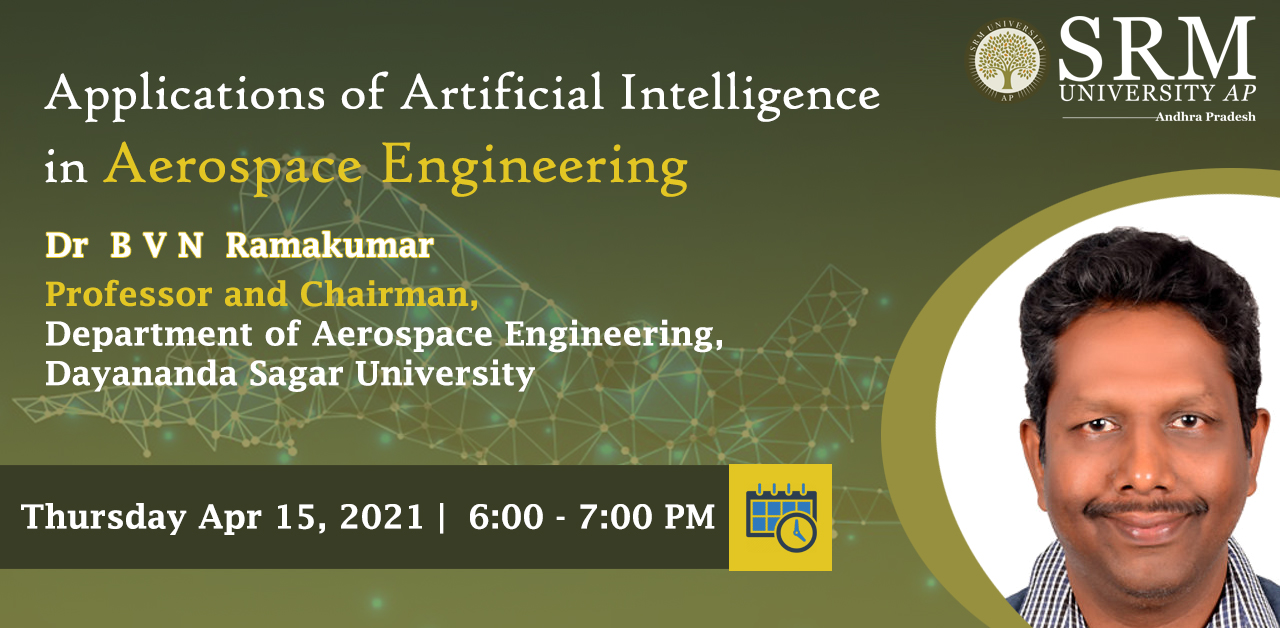 On April 15, 2021, the Department of Mechanical Engineering, SRM University-AP, Andhra Pradesh, hosted a virtual lecture session with Dr B V N Ramakumar, Professor and HOD, Department of Aerospace Engineering, Dayananda Sagar University, Bangalore. Addressing the Webinar, Dr Lakshmi Sirisha Maganti and Dr Venkata Nori, Faculty, Department of Mechanical Engineering, handed over the podium to Dr Ramakumar. Initiating the discussion with a brief understanding of the background of Artificial Intelligence (AI), Dr Ramakumar described the AI Applications in Space, Civil and Defense industry. Apart from highlighting the overview and functionality of AI Applications in Aerospace Engineering, he outlined the challenges associated with it.
On April 15, 2021, the Department of Mechanical Engineering, SRM University-AP, Andhra Pradesh, hosted a virtual lecture session with Dr B V N Ramakumar, Professor and HOD, Department of Aerospace Engineering, Dayananda Sagar University, Bangalore. Addressing the Webinar, Dr Lakshmi Sirisha Maganti and Dr Venkata Nori, Faculty, Department of Mechanical Engineering, handed over the podium to Dr Ramakumar. Initiating the discussion with a brief understanding of the background of Artificial Intelligence (AI), Dr Ramakumar described the AI Applications in Space, Civil and Defense industry. Apart from highlighting the overview and functionality of AI Applications in Aerospace Engineering, he outlined the challenges associated with it.Dr Ramakumar completed his bachelor’s from Ranchi University, and he pursued a master’s from Andhra University. Dr Ramakumar holds a Doctorate Degree from IIT Madras and has years of experience in research, academia and industry. Dr Ramakumar worked for Rolls Royce India Pvt Ltd and Honeywell Solutions Pvt Ltd. With contributions to the Auto Mechanics Industrial Sector, he also worked for the DMR Institute of Technology.
Dr Ramakumar was the visiting faculty at Manipal University. In terms of contribution to the field of engineering, he designed, developed, and analysed components for Boeing 777X, Airbus A350 and Honeywell HTF700 Engine Programme. Dr Ramakumar published papers in reputed National and International journals in addition to two patents to his credit.
Dr Ramakumar elucidated, “Artificial Intelligence is the broad sphere covering machine learning and deep learning as well. Moreover, a technique which mimics human behaviour”. Discussing the key players in the aviation industry, he explained the role of the mini-robots to capture the imagery clips of the inaccessible area in an aircraft. Implementation of the Artificial Reality techniques in the civil aviation industry is needed to reduce manual cost and time. AI applications manage the supply chain by gathering data as a part of the predictive measure. With the inclusion of automated tools, the civil aviation industry efficiently controls and optimises the security parameters.
During Dr Ramkumar’s proceeding, he added, “AI Application in aviation optimises the data related to flight scheduling, seat arrangement, cabin crew shift scheduling along with the management of the route mapping”. Starting from taking off to landing, AI Applications are being used widely in the aviation industry.
He further added that “Emerging as the dynamic technology, AI Applications marked their presence in the military intelligence too. Drones for military operations map the routes and record that in imagery forms to apprehend the nearby geographical location. The information stored in databases are sent and received without any manual meddling”.
Advancing to the next part of the discussion, Dr Ramakumar explained that “Speaking of the satellite link and communication, Robonauts are the new humanoid robots that would replicate the actual human beings by assisting in anything from gathering outer space information to exploring it”. Dr Ramakumar also propounds that “Productivity and Investment are few challenges amongst others that are common and would go hand in hand with the development of AI technology.” The discussion came to an end with an engaging Q&A session with the students followed by a Vote of Thanks by Dr Nori.
Continue reading → - “Chemists have to play a major role to achieve sustainable development”- opined Prof Lakshmi Kantam in the University Distinguished Lecture Series April 19, 2021
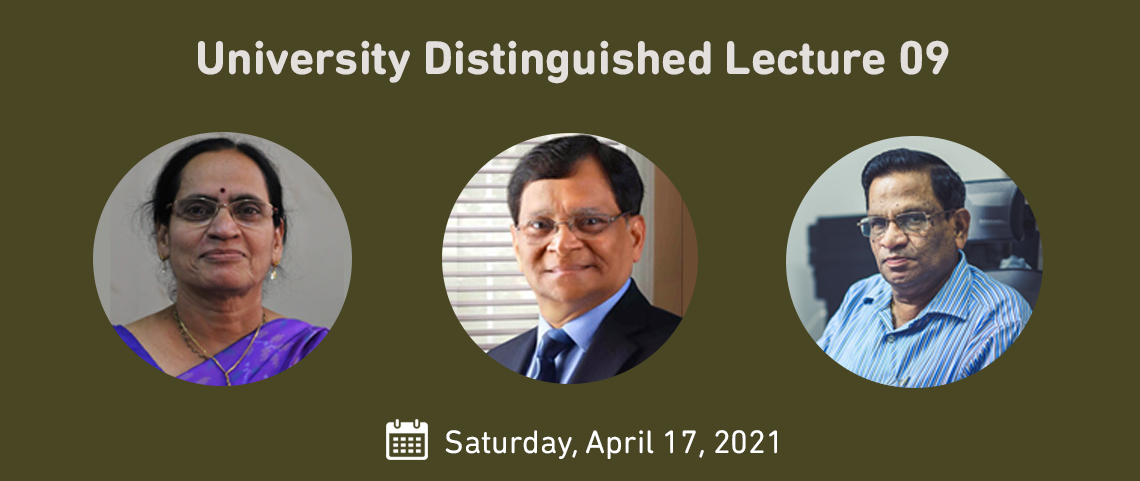 Observing the ninth edition of University Distinguished Lecture Series, SRM University, Andhra Pradesh, invited Prof Lakshmi Kantam Mannepalli, the Dr B P Godrej Distinguished Professor of Green Chemistry, Department of Chemical Engineering, Institute of Chemical Technology, Mumbai, to address a captivating speech on “Design and Development of Homogeneous/Heterogeneous Catalysts for Sustainable Chemical Industry”. Prof D Narayana Rao, Pro Vice-chancellor, inaugurated the talk with a welcome speech. The ceremony was attended by Prof VS Rao, Vice-Chancellor SRMAP and Dr S Mannathan, Department of Chemistry. Prof D Narayana Rao expressed that “Industrial collaboration is very much necessary in the context of self-reliant India (Atma Nirbhar Bharat)”.
Observing the ninth edition of University Distinguished Lecture Series, SRM University, Andhra Pradesh, invited Prof Lakshmi Kantam Mannepalli, the Dr B P Godrej Distinguished Professor of Green Chemistry, Department of Chemical Engineering, Institute of Chemical Technology, Mumbai, to address a captivating speech on “Design and Development of Homogeneous/Heterogeneous Catalysts for Sustainable Chemical Industry”. Prof D Narayana Rao, Pro Vice-chancellor, inaugurated the talk with a welcome speech. The ceremony was attended by Prof VS Rao, Vice-Chancellor SRMAP and Dr S Mannathan, Department of Chemistry. Prof D Narayana Rao expressed that “Industrial collaboration is very much necessary in the context of self-reliant India (Atma Nirbhar Bharat)”.Advancing with Prof Lakshmi Kanam’s presentation, she added, “Global and Indian chemical industry estimate 5.1 trillion and 108.4 billion USD in 2021. Catalysis is a highly demanded technology for a sustainable society and drives innovation in many other fields. Achieving the high catalytic selectivity is the aim of catalysis science in 21 st century”.
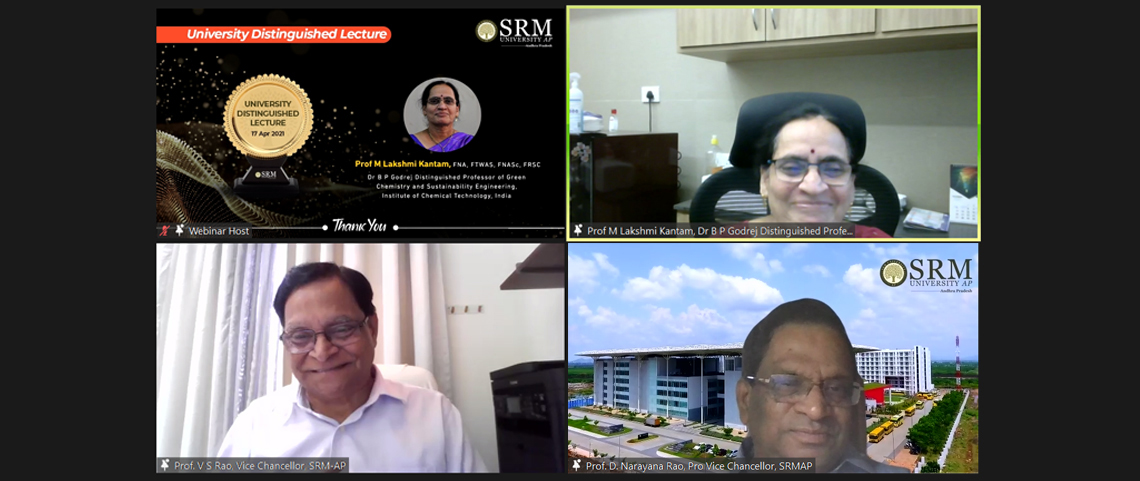 She also stated in her presentation, “The catalysis of organic reactions by homogeneous and heterogeneous catalysts remains a diversified field of scientific inquiry. It attracts a large group of scientists with specialities spanning synthetic organic chemistry, inorganic chemistry, surface science, material science, reaction engineering and computational modelling”.
She also stated in her presentation, “The catalysis of organic reactions by homogeneous and heterogeneous catalysts remains a diversified field of scientific inquiry. It attracts a large group of scientists with specialities spanning synthetic organic chemistry, inorganic chemistry, surface science, material science, reaction engineering and computational modelling”.As a part of Prof Lakshmi Kantam’ s research study, she briefly explained, “Hydroxyapatite (HA) is a hydrated calcium phosphate material, which is an important biomaterial because of its similarity to the mineral component of mammalian bone. We have utilised these materials, and their metal exchanged materials as catalysts for C-C and C-N coupling reactions. Similarly, hydrotalcite, anionic clays have been exchanged with different metal ions and successfully applied in a number of organic transformations”. An overview of the work on the design and development of catalysts for sustainable, economical process and technologies for the chemical industry was introduced.
Noted personality in the field of Chemical Sciences and Engineering, Prof Lakshmi Kantam holds esteemed titles of FNA, FTWAS, FNASc, FRSC. Her fields of expertise are Catalysis, Materials and Process Chemistry. Prof Lakshmi Kantam served as the Director of CSIR-Indian Institute of Chemical Technology, Hyderabad. Prof. Lakshmi Kantam is Non-Executive Independent Director of Godavari Bio Refineries Ltd, Indo Amines Ltd, Vinati Organics Ltd and several others.
Continue reading → - Dr Nimai Mishra explores the role of surface chemistry in improving photocatalytic applications April 8, 2021
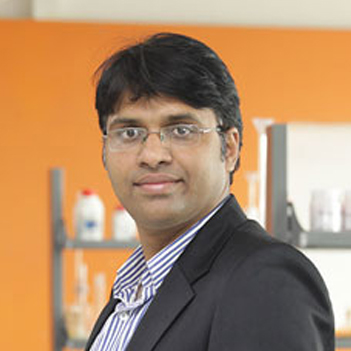 Dr Nimai Mishra, Assistant Professor, Department of Chemistry, SRM University-AP, Andhra Pradesh, along with his research group comprising of students pursuing PhD under him, Mr Syed Akhil and Ms V G Vasavi Dutt have published a research article titled “Surface Modification for Improving Photoredox Activity of CsPbBr3 Nanocrystals” in the Journal “Nanoscale Advances” (The Royal Society of Chemistry).
Dr Nimai Mishra, Assistant Professor, Department of Chemistry, SRM University-AP, Andhra Pradesh, along with his research group comprising of students pursuing PhD under him, Mr Syed Akhil and Ms V G Vasavi Dutt have published a research article titled “Surface Modification for Improving Photoredox Activity of CsPbBr3 Nanocrystals” in the Journal “Nanoscale Advances” (The Royal Society of Chemistry).Inorganic lead halide perovskite nanocrystals (PNCs) are used in photocatalytic reactions in the modern era. The surface chemistry of the PNCs can play an important role in the excited state interactions and efficient charge transfer with redox molecules. In this work, Dr Mishra’s research group explored the impact of CsPbBr3 nanocrystal surface modification on the excited state interactions with the electron acceptor benzoquinone (BQ) for three different ligand environments: as oleic acid/oleylamine (OA/OAm), oleic acid (OA)/ trioctylphosphine (TOP), and oleic acid (OA)/ oleylamine (OAm)/ trioctylphosphine (TOP) ligands.
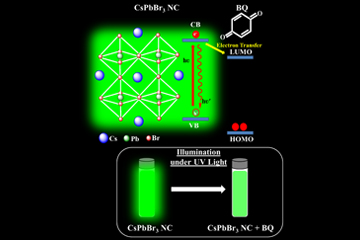 The research infers that amine-free PNCs (OA/TOP capped) exhibit the best-excited state interactions with benzoquinone as compared to the conventional oleylamine ligand environment. The photoinduced electron transfer (PET) rate constants were measured from PL-lifetime decay measurement. The amine-free PNCs show the highest PET which is 9 times higher than conventional ligands capped PNCs. These results highlight the impact of surface chemistry on excited-state interactions of CsPbBr3 NCs and in photocatalytic applications.
The research infers that amine-free PNCs (OA/TOP capped) exhibit the best-excited state interactions with benzoquinone as compared to the conventional oleylamine ligand environment. The photoinduced electron transfer (PET) rate constants were measured from PL-lifetime decay measurement. The amine-free PNCs show the highest PET which is 9 times higher than conventional ligands capped PNCs. These results highlight the impact of surface chemistry on excited-state interactions of CsPbBr3 NCs and in photocatalytic applications.More importantly, this work concludes that amine-free PNCs maintain a redox-active surface with a high photoinduced electron transfer rate which makes them an ideal candidate for photocatalytic applications.
To read the full paper: Please Click Here
Continue reading → - Dr Jatindra Kumar Dash devices technique for easy detection of Interstitial Lung Diseases April 5, 2021
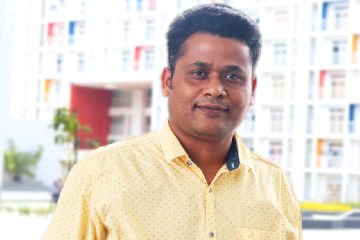 Dr Jatindra Kumar Dash, Associate Professor, Computer Science and Engineering, has recently published a paper, “Content-based image retrieval system for HRCT lung images: Assisting radiologists in self-learning and diagnosis of Interstitial Lung Diseases” in the reputed Springer Journal- Multimedia Tools and Applications. The research has been carried out in collaboration with Prof. Sudipta Mukhopadhyay, IIT Kharagpur and Professor & Head, Department of RADIO DIAGNOSIS & IMAGING, Post Graduate Institute of Medical Education and Research, Chandigarh.
Dr Jatindra Kumar Dash, Associate Professor, Computer Science and Engineering, has recently published a paper, “Content-based image retrieval system for HRCT lung images: Assisting radiologists in self-learning and diagnosis of Interstitial Lung Diseases” in the reputed Springer Journal- Multimedia Tools and Applications. The research has been carried out in collaboration with Prof. Sudipta Mukhopadhyay, IIT Kharagpur and Professor & Head, Department of RADIO DIAGNOSIS & IMAGING, Post Graduate Institute of Medical Education and Research, Chandigarh.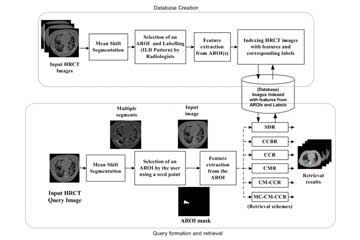 Content-based Image Retrieval (CBIR) is a technique that can exploit the wealth of the data stored in the repository and help radiologists in decision making by providing references to the image in hand. A CBIR system for High-Resolution Computed Tomography (HRCT) lung images depicting the sign of Interstitial Lung Diseases (ILDs) is built, and the system can be used as a self-learning tool by budding radiologists. The system is built by addressing several challenges using advanced machine learning techniques. The objective of this work is to develop a CBIR system for ILDs that is reliable and needs minimal human intervention for ling disease diagnosis.
Content-based Image Retrieval (CBIR) is a technique that can exploit the wealth of the data stored in the repository and help radiologists in decision making by providing references to the image in hand. A CBIR system for High-Resolution Computed Tomography (HRCT) lung images depicting the sign of Interstitial Lung Diseases (ILDs) is built, and the system can be used as a self-learning tool by budding radiologists. The system is built by addressing several challenges using advanced machine learning techniques. The objective of this work is to develop a CBIR system for ILDs that is reliable and needs minimal human intervention for ling disease diagnosis.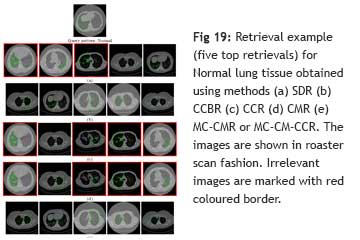 The system developed will act as a helping tool for radiologist by providing a second opinion for the diagnosis of a diverse group of lung diseases called Interstitial Lung Disease. It will help the budding radiologist for self-learning. When used in daily medical practice, the system may reduce the workload of radiologists in countries, having a low number of physicians per inhabitants.
The system developed will act as a helping tool for radiologist by providing a second opinion for the diagnosis of a diverse group of lung diseases called Interstitial Lung Disease. It will help the budding radiologist for self-learning. When used in daily medical practice, the system may reduce the workload of radiologists in countries, having a low number of physicians per inhabitants. Dr Dash is associated with SRM University-AP for almost three years. His research interests include Content-Based Image Retrieval, Medical Image Analysis and Texture Analysis. He has currently employed his time into the design and development of a Computer-Aided Diagnosis System for Lung Cancer Screening.
Dr Dash is associated with SRM University-AP for almost three years. His research interests include Content-Based Image Retrieval, Medical Image Analysis and Texture Analysis. He has currently employed his time into the design and development of a Computer-Aided Diagnosis System for Lung Cancer Screening. Read More: https://link.springer.com/article/10.1007/s11042-020-10173-4
Continue reading → - Faculty members of SRM University-AP awarded separate research grants by the National Supercomputing Mission (NSM), Government of India April 5, 2021
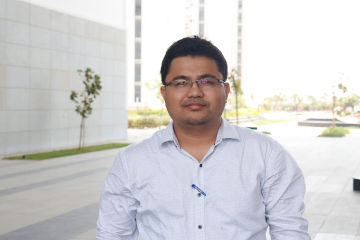 Prof Ranjit Thapa, Professor, Department of Physics, SRM University – AP, Andhra Pradesh has been awarded a first-year grant of Rs 28 Lakhs by the National Supercomputing Mission (NSM), supported by the Department of Science and Technology (DST) in collaboration with the Ministry of Electronics and Information Technology (MeITy), Government of India. Prof Ranjit will be working on the project titled “Catalysts for CO2 Reduction to C2 Product: Descriptor to Database” as the project leader. He has started the work to search for the best catalyst to convert CO2 into useful product and hence solving the problem of climate change due to large production of CO2 through different sources.
Prof Ranjit Thapa, Professor, Department of Physics, SRM University – AP, Andhra Pradesh has been awarded a first-year grant of Rs 28 Lakhs by the National Supercomputing Mission (NSM), supported by the Department of Science and Technology (DST) in collaboration with the Ministry of Electronics and Information Technology (MeITy), Government of India. Prof Ranjit will be working on the project titled “Catalysts for CO2 Reduction to C2 Product: Descriptor to Database” as the project leader. He has started the work to search for the best catalyst to convert CO2 into useful product and hence solving the problem of climate change due to large production of CO2 through different sources.CO2 is a known greenhouse gas and key reason for global warming and climate change. Can we challenge mother nature by converting CO2, a greenhouse gas into energy with the required efficiency? This is a mystery and a mammoth problem and a much-needed problem to be solved with a fundamental approach. Prof Ranjit Thapa believes that metal nanocatalyst on support materials can solve the problem and can increase the efficiency of CO2 reduction to C2 products, viz., ethylene (C2H4) and ethanol (C2H5OH). An experimental approach to find the best catalyst for CO2 reduction needs enormous funds and trials, and a long time is required to develop the exact catalyst for industry application. The mammoth task is to find the suitable composition, shape, and size of metal nanoparticle (MNP) on an appropriate surface for the catalytic reactions. Prof. Ranjit proposes that this can be achieved by computational modelling using Density Functional Theory (DFT) through finding and estimating the electronic descriptor and revealing active sites through structure-activity relations. Recent progress in Machine Learning (ML) for materials with DFT modelling drives towards rational design of catalysts. The electronic descriptor, storage of MNP/support information in the database followed by prediction using Machine Learning (using predictive model equation) will help to narrow down the search for the best catalyst for CO2 reduction to C2 species.
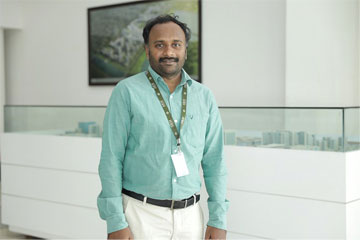 Further, Dr Mahesh Kumar Ravva, Assistant Professor, Department of Chemistry, SRM University – AP, Andhra Pradesh received Rs 19.92 Lakhs as the first instalment from DST-National Supercomputing Mission (NSM). His project’s primary focus will be on understanding the critical factors that influence the performance of organic solar cells. Using the supercomputer, his research group will model the electronic process that occurs during solar cell operation. The outcome of this project will guide experimentalists to develop organic solar cells with higher efficiency. Organic solar cells are flexible, lightweight, and low-cost and have many exciting applications in wearable electronic devices, smart windows, etc.
Further, Dr Mahesh Kumar Ravva, Assistant Professor, Department of Chemistry, SRM University – AP, Andhra Pradesh received Rs 19.92 Lakhs as the first instalment from DST-National Supercomputing Mission (NSM). His project’s primary focus will be on understanding the critical factors that influence the performance of organic solar cells. Using the supercomputer, his research group will model the electronic process that occurs during solar cell operation. The outcome of this project will guide experimentalists to develop organic solar cells with higher efficiency. Organic solar cells are flexible, lightweight, and low-cost and have many exciting applications in wearable electronic devices, smart windows, etc.Prof V S Rao, Vice-Chancellor, SRM University – AP, and Prof D Narayana Rao, Pro Vice-Chancellor, SRM University – AP congratulated Prof Ranjit Thapa and Dr Mahesh Kumar Ravva. Prof Narayana Rao said, “Necessary facilities and support will be provided by the University to effectively carry out the two projects.”
Continue reading → - Undergrad CSE student bags envious placement offer with a CTC of 20 Lakh LPA April 3, 2021
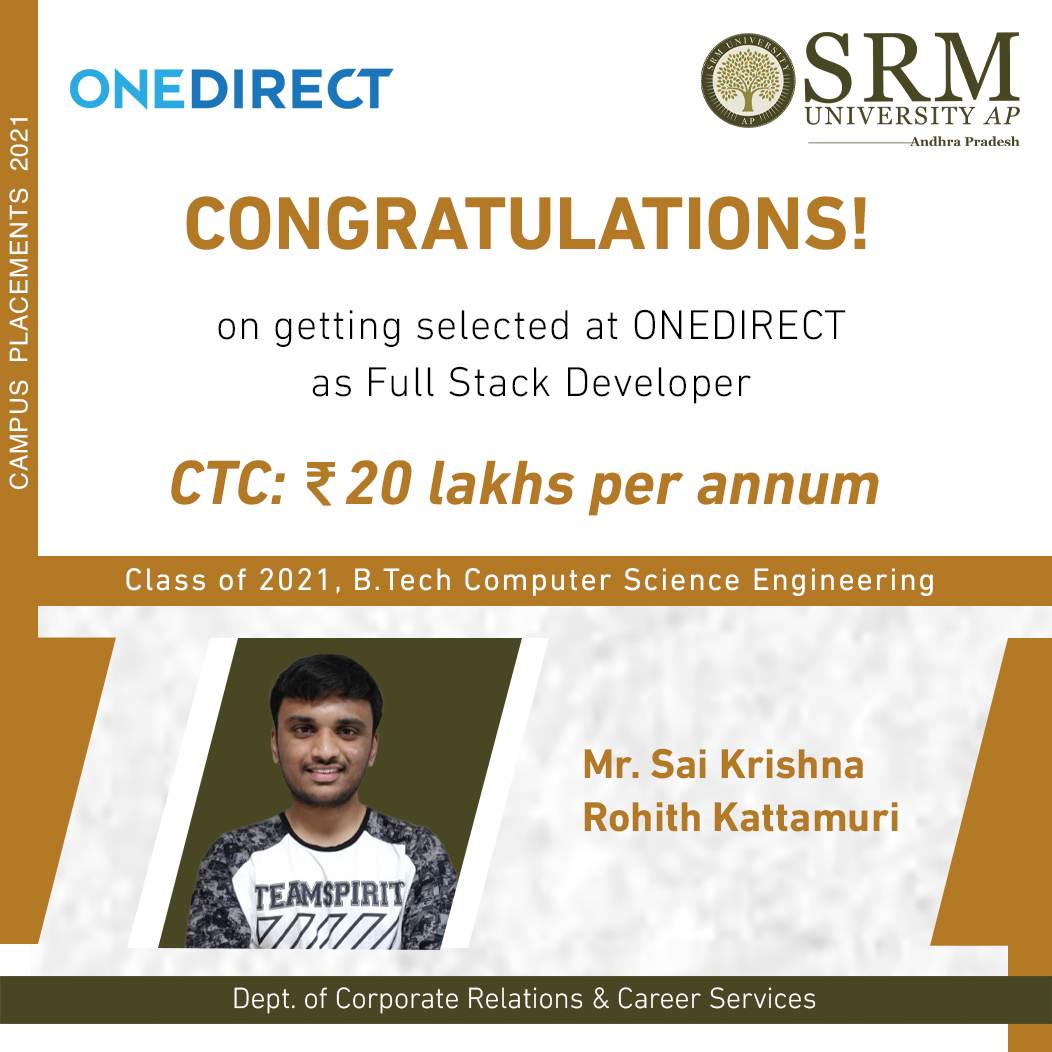 Another proud moment for SRM University-AP when Kattamuri Sai Krishna Rohith bagged an envious job offer from ODCEM Technologies Pvt. Ltd. (OneDirect) with a CTC of 20 Lakhs per annum. He is pursuing his B. Tech final year in the Department of Computer Science and Engineering.
Another proud moment for SRM University-AP when Kattamuri Sai Krishna Rohith bagged an envious job offer from ODCEM Technologies Pvt. Ltd. (OneDirect) with a CTC of 20 Lakhs per annum. He is pursuing his B. Tech final year in the Department of Computer Science and Engineering.Mr Rohith will be joining the company as an intern for six months with monthly compensation of Rs. 20,000. After six months of internship, he will be offered the permanent employee as a Full Stack Developer with a CTC of Rs. 20,00,000 per annum.
Mr Rohith went through rigorous placement training programmes conducted by the Department of Corporate Relations and Career Services to secure the job offer. The job hiring process for this role was conducted in four stages. After preliminary selection, Mr Rohith had to prove his ability in coding, aptitude and other technical domains. The Director of Engineering himself took the final call before offering him a position in the company to see if Rohith is a proper fit for their company.
Rohith expressed his gratitude towards the CR & CS department of SRM University-AP, saying that the training sessions strengthened his core skills and abilities. He was also taught to face interviews and critical questions. Mr Rohith said, “Placement is an arduous process. I was offered another position in other company before, but I was not happy with that offer. I had faith in my abilities, so I continued searching for better opportunities and improve my skill set to secure the Super Dream offer. Keeping nerves in control, not panicking during interviews, excellent communication skills are some essential qualities that everyone should master to get good jobs. I am thankful to the CR & CS department for all their support and customised, personal, need-based assistance, which helped me a lot to prepare for the interviews,” said Mr Rohith.
After five months of determination, Mr Rohith finally secured the job that he was looking for. “The University has provided us with numerous opportunities with a flexible curriculum and Global standards. In addition to all the training, my mentors encouraged me to participate in Hackathons, apply for research internships, and attend conferences. Thanks to the extraordinary faculty that we have, the regular classes were of great help in enhancing my technical knowledge,” asserted Mr Rohith. Mr Rohith was a proud track-winner of Microsoft and EthDenver hackathons and a research Intern at Nanyang Technological University (NTU) Singapore.
He has shared his mantra to success with his fellows. Mr Rohith believes that instead of panicking or comparing with others, one should focus on becoming a better version of oneself, and the success will find him.
Continue reading → - Prof C Durga Rao receives a grant to enhance vaccine efficacy at a reduced cost March 27, 2021
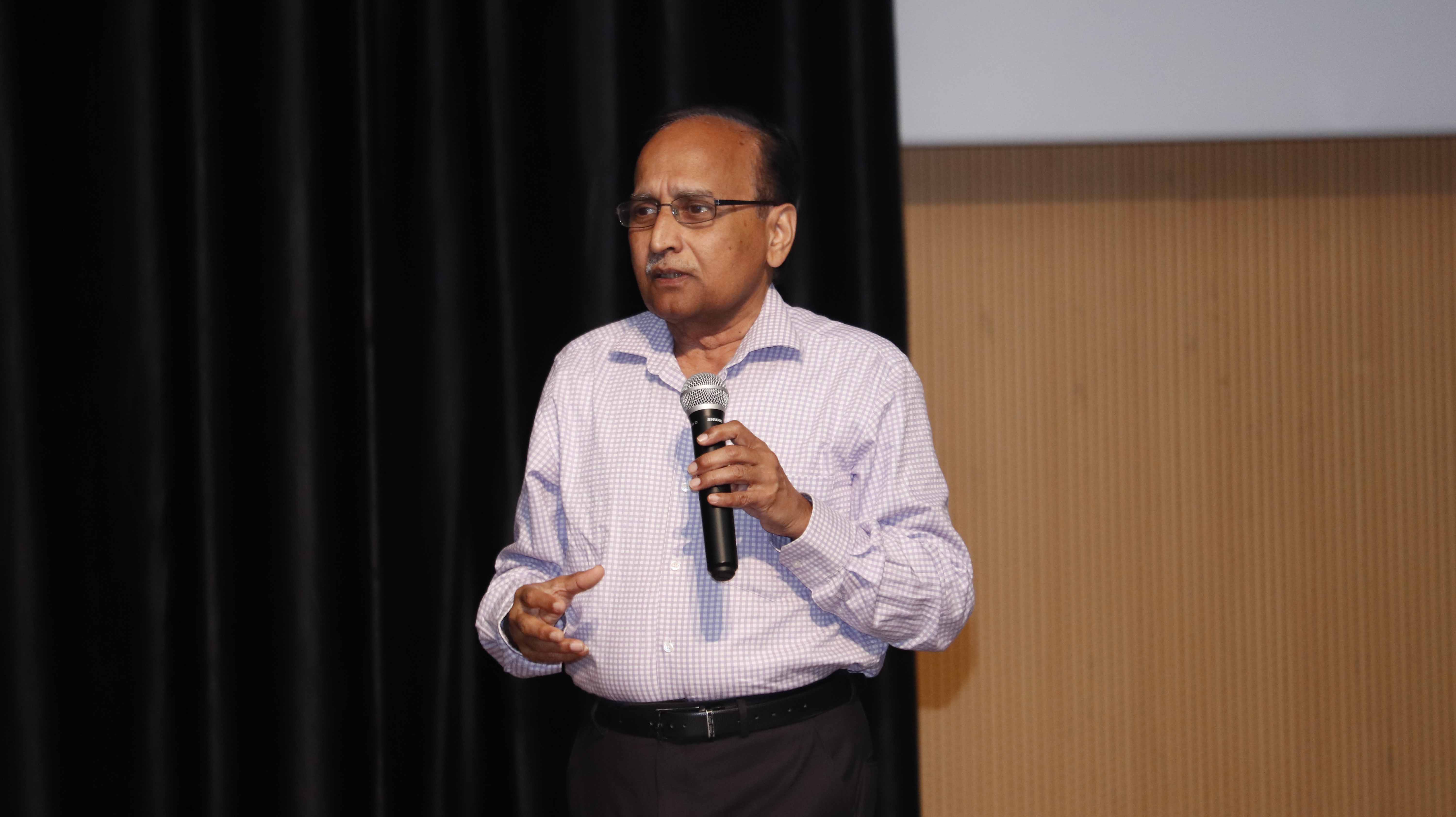 Prof C Durga Rao (Principal Investigator), Professor, Department of Biological Sciences, and Associate Dean, Sciences, Department of Biological Sciences, SRM University-AP, Andhra Pradesh has received a total outlay of Rs. 1,10,52,941/- from the Department of Biotechnology, Government of India, to work on the project titled “Understanding the molecular basis for the extreme differential level of expression of genes from human and animal rotaviruses in gene-transfected cells: Implications for improving the growth of human vaccine strains”. Using the grant, the professor will be spawning the appropriate facilities to perform cell culture and virus-related research at SRM University-AP.
Prof C Durga Rao (Principal Investigator), Professor, Department of Biological Sciences, and Associate Dean, Sciences, Department of Biological Sciences, SRM University-AP, Andhra Pradesh has received a total outlay of Rs. 1,10,52,941/- from the Department of Biotechnology, Government of India, to work on the project titled “Understanding the molecular basis for the extreme differential level of expression of genes from human and animal rotaviruses in gene-transfected cells: Implications for improving the growth of human vaccine strains”. Using the grant, the professor will be spawning the appropriate facilities to perform cell culture and virus-related research at SRM University-AP.Understanding how a virus overpowers the host resistance mechanisms and seizes the host cellular processes for its own growth is very challenging and is essential for the development of not only efficient viral vaccines but also for antiviral therapeutic strategies. Prof Durga Rao informs, “Rotavirus is the leading cause of severe and acute dehydrating diarrhoea in infants and children below 5 years of age. Efforts by us and Dr Bhan, former Secretary, Department of Biotechnology, Government of India, led to the discovery and development of the first made in India rotavirus vaccine, produced by Bharat Biotech, Hyderabad.”
In the earlier project, the professor Rao observed that while some human rotaviral proteins could be expressed at high levels when the cloned genes were introduced into mammalian cells, other proteins could not be expressed at detectable levels. However, the virus expresses copious amounts of all its proteins when it infects the cells. Prof Durga Rao further shares, “Within a few hours of infection, each virus employs several ploys in the infected cell to subvert the cellular defence and regulatory mechanisms and captures the host for its own progeny production.”
Based on the earlier observations, this project will advance to unravel the tricks employed by the virus, and viral transactions in the infected cells. The outcome of the project will have implications for genetically engineering the poorly growing human vaccine strains for their efficient growth in cell culture, leading to reduced cost of not only rotavirus vaccines, but also other viral vaccines.
Continue reading →

